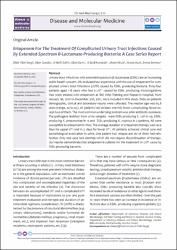Ertapenem for the treatment of complicated urinary tract ınfections caused by extended-spectrum β-lactamase-producing bacteria: A case series report

Göster/
Erişim
info:eu-repo/semantics/openAccessTarih
2014Yazar
Sevgi, Dilek YıldızGündüz, Alper
Şahin, Ahmet Melih
Derin, Okan
Konuklar, Ahmet Sanlı
Öncül, Ahsen
Sönmez, Emine
Üst veri
Tüm öğe kaydını gösterKünye
Sevgi DY, Gunduz A, Sahin AM, Derin O, Konuklar AS, Oncul A, Uzun N, Sonmez E. Ertapenem for the treatment of complicated urinary tract ınfections caused by extended-spectrum β-lactamase-producing bacteria: A case series report. Disease and Molecular Medicine. 2014;2(1):7-11 doi: 10.5455/dmm.20140416054553Özet
Urinary tract infections with extended-spectrum beta-lactamases (ESBL) are an increasing public health concern. We evaluated our experience with the use of ertapenem for complicated urinary tract infections (cUTI) caused by ESBL- producing bacteria. Sixty-four patients aged >18 years who had a cUTI caused by ESBL- producing microorganisms that were treated with ertapenem at Sisli Etfal Training and Research Hospital, from January 1st, 2010 to December 31st, 2011, were included in this study. Data on patients demographic, clinical and laboratory results were collected. The median age was 65.8 years (range, 30 to 95). All patients had at least one risk factor complicating factor except two of them. The most common underlying problem was prior antibiotic exposure. The pathogens isolated from urine samples were ESBL-producing E. coli in 49, ESBL-producing K. pneumoniae in 12 and ESBL-producing K. oxytoca in 2 patients. All were susceptible to ertapenem in vitro. The average duration of ertapenem therapy was 14+/-4 days for upper UTI and 11+/-2 days for lower UTI. All patients achieved clinical cure and bacteriological eradication in urine. One patient had relapse and six of them had reinfection. Only one case had diarrhea which did not require discontinuation of therapy. Our results demonstrate that ertapenem is suitable for the treatment of cUTI cause by ESBL-producing bacteria.

















